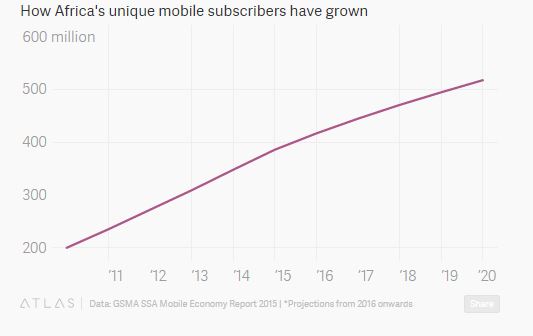What is holding back Africa’s mobile growth?
Stay up to date:
Future of Work
Africa’s mobile connections may be edging closer to the one-billion mark, but growth in unique mobile subscribers—the number of individuals that have subscribed to a mobile service—will slow down over the next years says a a new a report from GSMA, the international organization of mobile operators and companies.
Africa currently has 367 million unique mobile subscribers, and its fastest growth period for these subscriptions was in the first half of this decade (2010-2015), with an annual growth rate of 13%. The GSMA now expects the growth rate of unique mobile subscribers to slow down to 6% in the second half of the decade (2015-2020).
One of the reasons the GSMA has cited for slow down in growth is “a weak business case for rural network rollout”. According to GSMA mobile users in rural areas generate a low average revenue per user (ARPU) for mobile operators. The costs associated with setting up and maintaining networks in these areas is a barrier for operators wanting to extend their coverage, as it “makes it hard to justify the high costs of network deployment and maintenance in remote communities,” says the GSMA.
Tower sharing as a solution
Rural areas in Africa typically have a lower population density, making it difficult for operators to spread out their coverage. To address the coverage gap, the GSMA recommends (pdf, pg.5) infrastructure sharing as a strategy to extend coverage in rural areas.
In recent years, some of the continent’s leading operators, like MTN, have sold off their tower assets to tower management companies—known as “towercos”—to reduce their running costs. In turn, this has helped operators who may not have the infrastructure in particular areas to take out a tower lease from a towerco, in order to extend network coverage without incurring capital expenditure costs.
With over a quarter of Africa’s estimated 165 000 towers operated by independent tower management companies, tower the GSMA argues that infrastructure sharing could help “provide coverage in areas that would otherwise be uneconomical”.
This article is published in collaboration with Quartz Africa. Publication does not imply endorsement of views by the World Economic Forum.
To keep up with the Agenda subscribe to our weekly newsletter.
Author: Sibusiso Tshabalala is Quartz Africa’s reporter in South Africa.
Image: A Somali man browses the internet on his mobile phone at a beach. REUTERS/Feisal Omar.
Don't miss any update on this topic
Create a free account and access your personalized content collection with our latest publications and analyses.
License and Republishing
World Economic Forum articles may be republished in accordance with the Creative Commons Attribution-NonCommercial-NoDerivatives 4.0 International Public License, and in accordance with our Terms of Use.
The views expressed in this article are those of the author alone and not the World Economic Forum.
Related topics:
Forum Stories newsletter
Bringing you weekly curated insights and analysis on the global issues that matter.
More on Emerging TechnologiesSee all
Elena Fersman
May 14, 2025
Rya G. Kuewor
May 13, 2025
Tea Trumbic and Dhivya O’Connor
May 13, 2025
Anurag Sinha
May 9, 2025
Jake Okechukwu Effoduh
May 7, 2025







